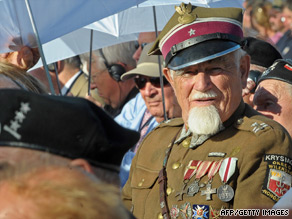
On a sand swept stretch of Afghanistan, a high-ranking Polish general put his country’s mission there into perspective.
He explained to a NATO delegation that Polish troops remind Afghan locals of two things about the mission: They are not Soviets and they know how difficult it is to live under foreign occupation. It is hard to ignore the incomparable price Poland paid during World War II. It was attacked by Germany, invaded by the Soviets, and became home to the notorious Nazi concentration camp Auschwitz. After six brutal years, Poles were the victors in war but losers in peace, living for four decades under Soviet repression. Many here will tell you they still have not come to terms with their fate after the war. Seven decades after the start of World War II, the conflict still defines Polish identity and history. September 1, 2009 in Westerplatte, Poland turned out to be a blue sky day even as dignitaries and notably the leaders of Poland, Russia and Germany turned out to remember the dark horrors that so changed their histories. The leaders laid wreaths to honor the ‘Defenders of Westerplatte’, the men who died in the battle that started it all.
Don’t Miss
iReport.com: Send your World War II stories
Musicians play for peace to mark WWII anniversary
Petition seeks apology for Enigma code-breaker Turing
Leaders mark 70th anniversary of WWII
It was here at this strategic port on the Baltic Sea, Danzig, now Gdansk, that Nazi Germany’s surprise attack on Poland triggered six years of bloodletting, a savage Holocaust and the death of more than 50 million people. The Polish Prime Minister, Donald Tusk, called it a war against humanity itself. Tusk also answered critics who felt his country and the world should now move on from World War II. He warned that if anniversaries are not marked and ceremonies not planned, there may be nothing to shield us from the brutality of future wars. But still today the events of the last 70 years have left their mark and fueled some modern day controversies. Send us your war stories Russian Prime Minister Vladimir Putin tried to appeal directly to the people of Poland in an open letter. He reminded them that at least 27 million Russians died in the conflict but also warned against equating the Soviet Union’s role in World War II with the menace of Hitler’s Nazism. “..exploiting memory, anatomizing history and seeking pretexts for mutual complaints and resentment causes a lot of harm. ” wrote Putin. He backed that up with public comments saying, “If we talk about an objective assessment of history, we should understand that it had no one color. It was varied and there were huge number of mistakes committed by many sides. All these actions, in one way or another, created conditions for the beginning of a large-scale aggression by Nazi Germany.”
Putin was at the heart of a tug-of-war over the war. Some Poles say Stalin was as evil and complicit as Hitler during the war. Russians say that callously overlooks the sacrifice of Russians in defeating Nazism and liberating Europe. In fact, it took German Chancellor Angela Merkel to put their achievement in perspective. She said that a unified, peaceful Europe was a blessing and indeed a miracle.